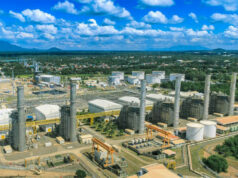THE Board of Investments (BoI) said Friday that Japanese firms based in the Kyushu region have formalized their interest in finding new business opportunities in the Philippines and have signed a memorandum of understanding with the agency.
“Kyushu’s focus on seeking new trading partners for their region is a perfect fit for the Philippines’ goal of creating new trade arrangements with non-traditional partners,” Trade Secretary Ramon L. Lopez, whose department controls the BoI, said in a statement.
Kyushu is the southernmost and third-largest of Japan’s main islands. Its largest city is Fukuoka.
Mr. Lopez said through the MoU, the BoI is confident of finding “complementarities” between industries in the Philippines and Kyushu.
Mr. Lopez, who is also BoI chairman, added: “the Philippines itself is committed to attracting investments that would strengthen the country’s industrial foundation, such as in heavy and upstream industries.”
He was a signatory to the MoU between the BoI and the Kyushu Economy International (KEI) through Kyushu Economic Federation Chairman Yutaka Aso at the New World Hotel in Makati City on July 16.
The BoI said the MoU aims to “promote economic exchange, deepen people-to-people understanding and friendship for mutual economic development in the Philippines and the Kyushu region of Japan.”
“Under the agreement, both parties will collaborate in the promotion of investments to encourage the establishment and expansion of businesses; information exchange; and provision of support to facilitate inward investments to each other,” it added.
Mr. Lopez said the Philippines and KEI could collaborate in many areas because of “natural synergies.”
He identified priority sectors as electronic manufacturing services; automotive and auto parts; aerospace parts; chemicals; shipbuilding; design-oriented furniture and garments; tool and die; and agri-business.
Other areas are in the services sector, including information technology and business process management (IT-BPM); transport and logistics; tourism; and in construction sectors.
Mr. Lopez said the Philippines can offer Kyushu firms opportunities in clean energy and electronics products, citing the country’s standing as the second-largest producer of geothermal energy in the world. Opportunities are also available in semiconductors and electronics, which account for more than half of the country’s total exports.
He said he was confident that the MoU would create more opportunities for trade and investment engagements between the two parties. It can also as “a jump-off point and a platform for discussions between the dynamic business communities of the Kyushu region and the Philippines,” he added.
The BoI described KEI as the primary organization for international economic exchanges in Kyushu and serves as a cooperative venture between local governments, economic organizations and private firms in the region.
The agency quoted Mr. Aso as saying: “We have sectors like semiconductors, automotive, agriculture and tourism. These are areas which are growing fast. Kyushu has reached a production output of nearly $400 billion per year and we would like to… (pave) the way for a larger share of Japan’s economy. We have a tagline, ‘Move Japan Forward from Kyushu.’ So we want to grow Kyushu to a larger economy.”
He added: “The Philippines has a large market with a young labor force. It is one of the most attractive places in Asia with one of the fastest growing economies. It is possible that a company in Kyushu will advance to the Philippines and cooperate with companies to create new businesses that Kyushu cannot do and develop it (across) the ASEAN region. We highly hope that this MoU will trigger business development between Kyushu and the Philippines.” — Victor V. Saulon



